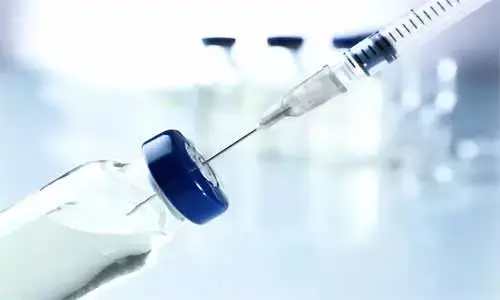- Home
- Medical news & Guidelines
- Anesthesiology
- Cardiology and CTVS
- Critical Care
- Dentistry
- Dermatology
- Diabetes and Endocrinology
- ENT
- Gastroenterology
- Medicine
- Nephrology
- Neurology
- Obstretics-Gynaecology
- Oncology
- Ophthalmology
- Orthopaedics
- Pediatrics-Neonatology
- Psychiatry
- Pulmonology
- Radiology
- Surgery
- Urology
- Laboratory Medicine
- Diet
- Nursing
- Paramedical
- Physiotherapy
- Health news
- Fact Check
- Bone Health Fact Check
- Brain Health Fact Check
- Cancer Related Fact Check
- Child Care Fact Check
- Dental and oral health fact check
- Diabetes and metabolic health fact check
- Diet and Nutrition Fact Check
- Eye and ENT Care Fact Check
- Fitness fact check
- Gut health fact check
- Heart health fact check
- Kidney health fact check
- Medical education fact check
- Men's health fact check
- Respiratory fact check
- Skin and hair care fact check
- Vaccine and Immunization fact check
- Women's health fact check
- AYUSH
- State News
- Andaman and Nicobar Islands
- Andhra Pradesh
- Arunachal Pradesh
- Assam
- Bihar
- Chandigarh
- Chattisgarh
- Dadra and Nagar Haveli
- Daman and Diu
- Delhi
- Goa
- Gujarat
- Haryana
- Himachal Pradesh
- Jammu & Kashmir
- Jharkhand
- Karnataka
- Kerala
- Ladakh
- Lakshadweep
- Madhya Pradesh
- Maharashtra
- Manipur
- Meghalaya
- Mizoram
- Nagaland
- Odisha
- Puducherry
- Punjab
- Rajasthan
- Sikkim
- Tamil Nadu
- Telangana
- Tripura
- Uttar Pradesh
- Uttrakhand
- West Bengal
- Medical Education
- Industry
COVID-19 vaccine trial starts, expert advises following standard safety protocols

Nearly 200,680 people around the world have been infected with COVID-19, with more than 8,000 deaths, as of now.
Initial trials of a vaccine to protect against COVID-19 started, officials with the U.S. National Institutes of Health announced. The search for a vaccine against the novel coronavirus is vital but cannot be rushed and must respect standard safety protocols, a leading expert has cautioned.
"It's essential that we work as hard and fast as possible to develop drugs and vaccines that are widely available across the world," Shibo Jiang, professor of virology at Shanghai's University of Fudan and the New York Blood Center, wrote in the journal Nature.
The Phase I clinical trial evaluating the vaccine is being conducted at Kaiser Permanente Washington Health Research Institute in Seattle, with funding support from the NIH's National Institute of Allergy and Infectious Diseases.
The first patient was given the vaccine on Monday, NIH said, and the trial is expected to enrol 45 healthy adult volunteers over the next six weeks.
"Finding a safe and effective vaccine to prevent infection with SARS-CoV-2 is an urgent public health priority," NIAID Director Anthony S. Fauci said in a statement. "This Phase I study, launched in record speed, is an important first step toward achieving that goal."
The vaccine, called mRNA-1273, was developed by NIAID scientists and their collaborators at Moderna, Inc., a biotech firm based in Cambridge, Massachusetts, with support from the Coalition for Epidemic Preparedness Innovations. The newly launched study will evaluate different doses of the experimental vaccine for safety and its ability to induce an immune response in participants.
The trial is the first of multiple steps in the clinical trial process to evaluate the vaccine's potential benefit against COVID-19, the coronavirus that has sickened more than 170,000 people in 127 countries. More than 6,000 have died from the disease since it was first identified in Wuhan, China, in late December.
In the United States, the Seattle area has been hit hardest so far by the global pandemic. Currently, no approved vaccines exist to prevent infection with COVID-19, and there are no proven antivirals to treat it.
Scientists at NIAID's Vaccine Research Center and Moderna were able to develop mRNA-1273 because of prior studies of related coronaviruses that cause severe acute respiratory syndrome and the Middle East respiratory syndrome. In fact, NIAID and Moderna scientists already were already working on an investigational MERS vaccine, and these efforts gave them a head start for developing a vaccine candidate to protect against COVID-19.
Once the genetic information for the virus became available in January, the scientists selected a sequence to express the stabilized protein of the virus, which binds to human cells, in the existing mRNA platform. To date, the mRNA-1273 vaccine has already shown promise in animal models, but this is the first trial to examine it in humans.
In the study, being led Dr Lisa A. Jackson, a senior investigator at Kaiser Permanente Washington Health Research Institute, participants will receive two doses of the vaccine via intramuscular injection in the upper arm about 28 days apart. Each participant will be assigned to receive a 25 microgram, 100 micrograms or 250 microgram dose at both vaccinations, with 15 people in each dose cohort.
Experts have warned that a vaccine could be more than a year away as clinical trials need to ensure it is safe in human test subjects before distributing to the wider public.
Hina Zahid Joined Medical Dialogue in 2017 with a passion to work as a Reporter. She coordinates with various national and international journals and association and covers all the stories related to Medical guidelines, Medical Journals, rare medical surgeries as well as all the updates in the medical field. Email: editorial@medicaldialogues.in. Contact no. 011-43720751
Dr Kamal Kant Kohli-MBBS, DTCD- a chest specialist with more than 30 years of practice and a flair for writing clinical articles, Dr Kamal Kant Kohli joined Medical Dialogues as a Chief Editor of Medical News. Besides writing articles, as an editor, he proofreads and verifies all the medical content published on Medical Dialogues including those coming from journals, studies,medical conferences,guidelines etc. Email: drkohli@medicaldialogues.in. Contact no. 011-43720751


